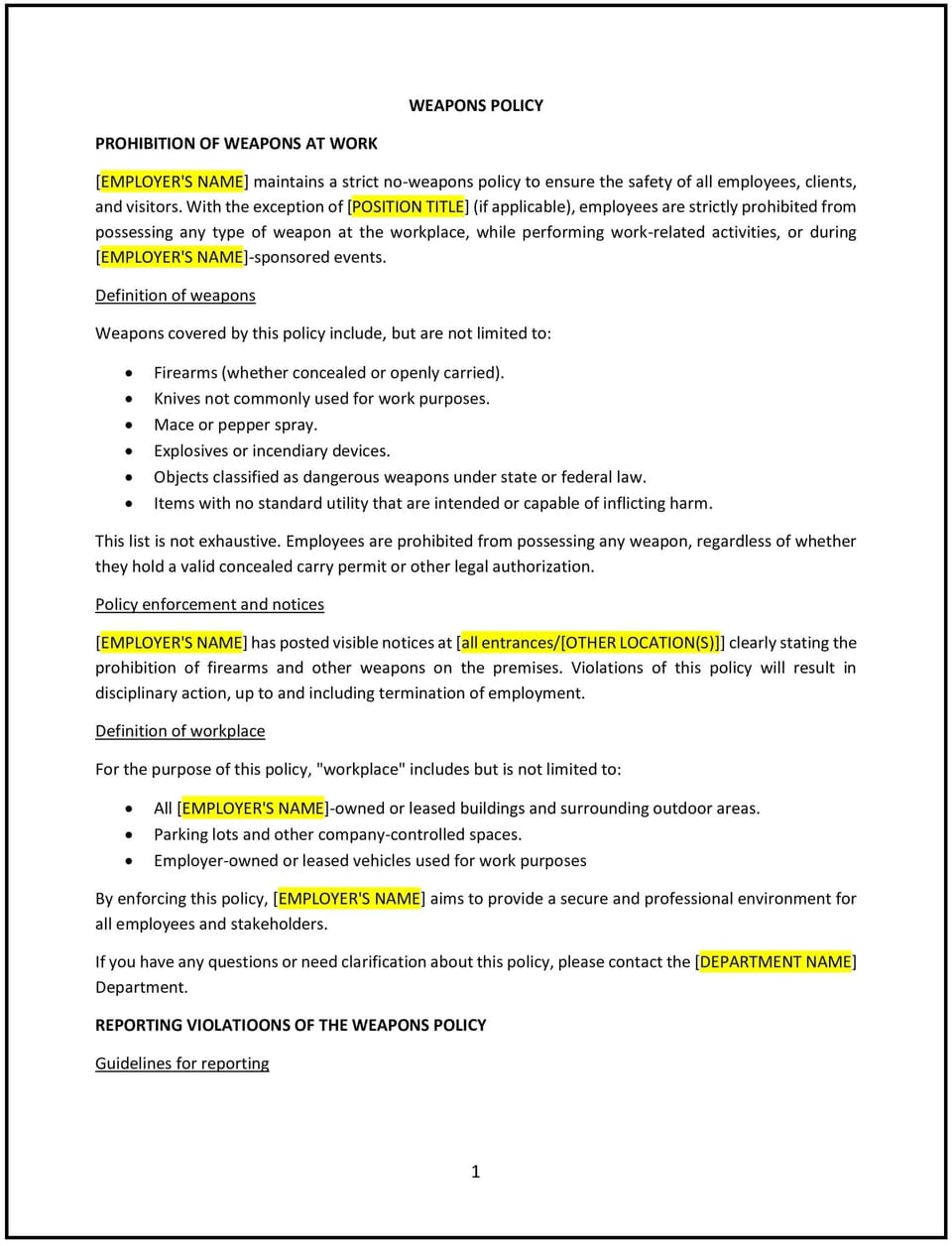Weapons policy (Delaware): Free template

Weapons policy (Delaware)
A weapons policy helps Delaware businesses maintain a safe and secure work environment by establishing clear guidelines on the possession, use, and storage of weapons in the workplace. This policy outlines prohibited items, reporting procedures, and enforcement actions, ensuring compliance with Delaware laws while promoting employee safety.
By implementing this policy, businesses can reduce risks, protect employees, and foster a secure workplace culture.
How to use this weapons policy (Delaware)
- Define prohibited items: Clearly specify weapons covered under the policy, such as firearms, knives (beyond permissible length), explosives, and other dangerous items.
- Clarify exceptions: Outline any exceptions, such as weapons carried by authorized law enforcement personnel or items permitted under Delaware laws with specific conditions.
- Establish reporting procedures: Provide employees with a clear process for reporting suspected violations, including anonymous reporting options.
- Detail enforcement actions: Specify consequences for policy violations, ranging from warnings to termination, depending on the severity of the infraction.
- Promote workplace safety: Include measures such as security checks, signage, or training to enhance awareness and prevent incidents.
- Monitor compliance: Conduct regular reviews to ensure adherence to the policy and address emerging safety concerns.
Benefits of using this weapons policy (Delaware)
This policy offers several benefits for Delaware businesses:
- Enhances workplace safety: Reduces risks associated with unauthorized weapons and protects employees from potential harm.
- Ensures compliance: Aligns with Delaware laws and regulations regarding weapons in the workplace.
- Promotes transparency: Establishes clear expectations for employees regarding prohibited items and enforcement actions.
- Minimizes liability: Protects the company from legal risks associated with workplace violence or safety incidents involving weapons.
- Supports a positive culture: Fosters a secure and respectful environment, boosting employee confidence in workplace safety.
Tips for using this weapons policy (Delaware)
- Communicate the policy clearly: Ensure all employees understand the prohibited items, exceptions, and consequences outlined in the policy.
- Provide training: Offer education on workplace safety, including the importance of adhering to the weapons policy and recognizing potential risks.
- Use signage: Post visible notices about the weapons policy at workplace entrances to reinforce compliance and deter violations.
- Investigate reports promptly: Address all reported violations seriously and follow through with appropriate actions to maintain trust and safety.
- Update regularly: Review and revise the policy to reflect changes in Delaware laws, company practices, or safety standards.
Q: Why is a weapons policy important for my business?
A: This policy enhances workplace safety, ensures compliance with Delaware laws, and minimizes risks associated with unauthorized weapons.
Q: What types of weapons are prohibited under this policy?
A: Prohibited items typically include firearms, large knives, explosives, and other dangerous weapons, as specified in the policy.
Q: Are there exceptions for certain individuals under this policy?
A: Exceptions may include authorized law enforcement personnel or specific situations allowed under Delaware laws, as outlined in the policy.
Q: How should employees report suspected violations?
A: Employees should follow the reporting procedures detailed in the policy, such as notifying HR, their manager, or using an anonymous reporting system.
Q: How often should this policy be reviewed?
A: This policy should be reviewed annually or whenever Delaware laws, workplace practices, or safety standards change.
This article contains general legal information and does not contain legal advice. Cobrief is not a law firm or a substitute for an attorney or law firm. The law is complex and changes often. For legal advice, please ask a lawyer.


